Walking Into Ourselves: Pilgrimage as a Model for Developmental Coaching
Guest Blogger: Akasha, PhD, PCC (Fielding HOD PhD Alum) – www.solfireconsulting.com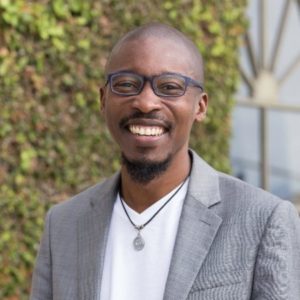
Coaching is as much a journey as pilgrimages are, minus the blisters and constant physical movement. Pilgrimages are quests to a sacred site. The effects of a pilgrimage continue long after the pilgrim arrives at the sacred center. As with coachees, pilgrims arrive at various milestones to continue on to the next one. Coachees and pilgrims are likely to experience some self-discovery, transformation, developmental shift, or growth along the journey.
There are several examples in western literature where pilgrimages are depicted as experiences of self-transformation and growth, including Dante’s Divine Comedy, Joyce’s Ulysses, Coehlo’s Santiago, and Equiano’s The Interesting Narrative of the Life of Olaudah Equiano (The African). The Camino de Santiago is one such obvious quest that is said to restore passion for life and facilitate transformative learning, spiritual awakening, and shifts in meaning-making (Saunders, 2018; Tisdell, 2017).
The almost 500-mile long Camino de Santiago, or the Way of St. James, is one of the most popular pilgrimages today. People have been walking the Camino since the 10th Century. Although it started out as a Christian journey, people from all religious traditions and those with no religious affiliation now walk this pilgrimage. Some people walk the Camino to overcome crisis, improve physical health, meet new people, and find clarity about their purpose and identity. Having inquired into the lived experiences of pilgrims, including my own journey along the Camino, and being a coach for over 10 years, I approach coaching conversations as quests that can reveal coachees to their sacred center, a higher self, and a clearer purpose.
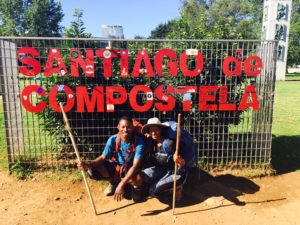
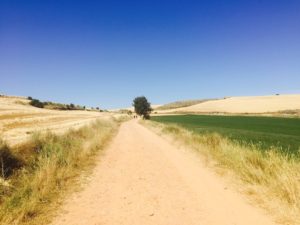
Walking the Camino pilgrimage changed my life. Throughout the journey, I was constantly making meaning, expressing those meanings, and always in-between new and old meanings as I transition from one way of viewing a particular object, such as God, to another way of understanding it. Because we are always making meaning, our coaching clients are also always on their own meaning-making journey. This approach to attending to coachees’ meaning-making, or cultivating their inner capacities, is the focus of The Pilgrimage Coaching Model that I am introducing here. This model mirrors a developmental coaching approach. That means rather than focusing on solving problems or achieving some fixed outcome, I focus on clients developing their meaning-making capacity so as to meet the increasing demands and complexities of their professional and personal worlds.
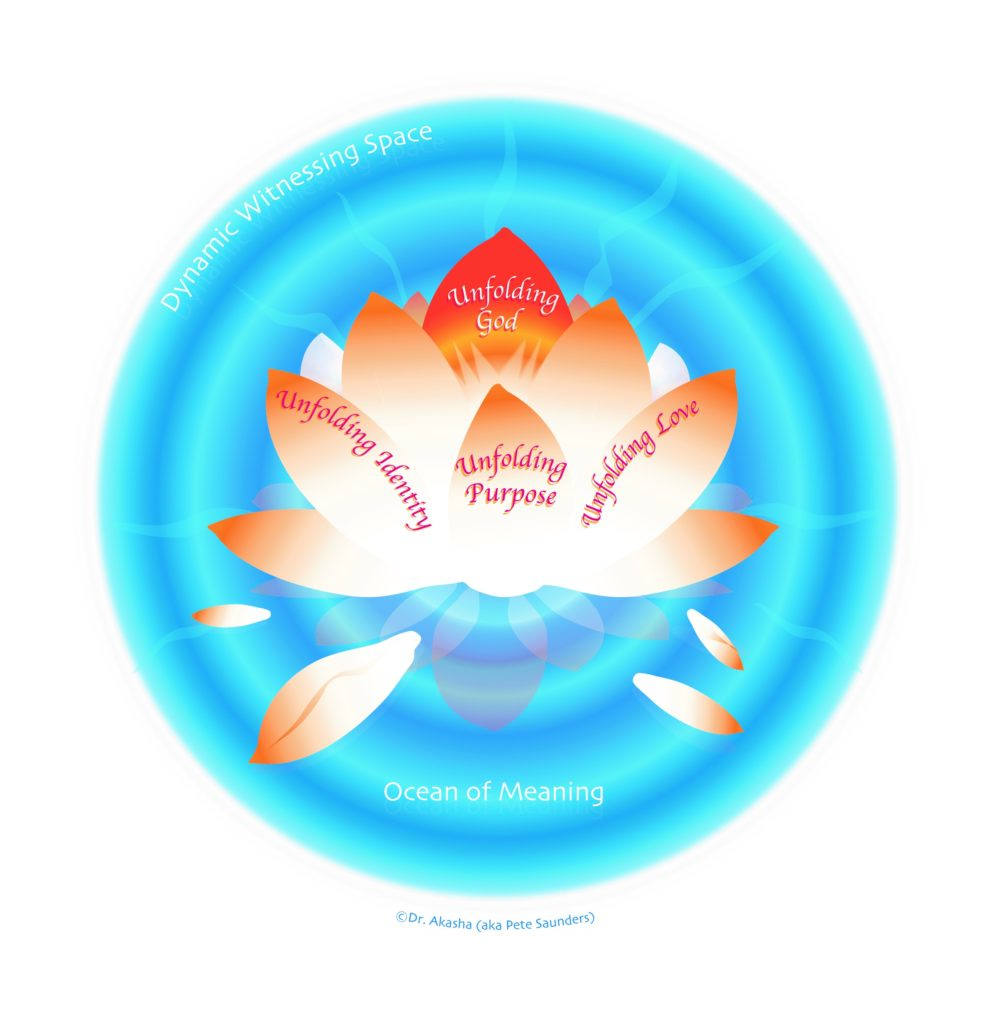
As developmental coaches and human growth specialists, we attend to meaning objects, the meaning that unfolds, and to the meaning maker or storyteller (Cook-Greuter, 2004). We also attend to the self (as instrument) that guides the unfolding of meaning. This is no simple task. It means observing and inquiring into multiple perspectives within the coachee as well as within one’s own being. Below is a brief description of the six key components of this model and how they interconnect and interact.
In this visual representation of the model, the petals indicate common meaning objects. The lotus is the meaning-maker. The lotus flower moves in and through an ocean of meaning to indicate that we humans cannot help but make meaning. We swim in an ocean of meaning.
The petals have to do with the coachee’s meanings about self, purpose, others, the world, and God. These meanings continually shift and evolve throughout their lifetime (Berger & Atkins, 2009; Cook-Greuter, 2013; Kegan, 1994). I focus on these four meaning-making objects in this model, primarily for illustrative purposes.
Unfolding Identity
The sense of identity shifts throughout our lifetime. As we develop, our various identities may lose their firmness and significance. Identity and sense of self are dynamic, complex, paradoxical, and ever unfolding. We include and transcend multiple dimensions of identity, including our shadow. Here, the coach maintains space for clients’ multiplicitous identities to show up.
Unfolding Purpose
Knowing our purpose makes life meaningful (Frankl, 1985; Wong, 1989). However, discovering our purpose can be a difficult and painful journey. What if the sense that our purpose eludes us is a natural part of our developmental journey? While our purpose may not change, our sense of what it is we are here to do changes over time.
Unfolding love
As we develop, love unfolds from subjective and exclusive to objective and all-inclusive. Our experience of love shifts and expands. When self and identity become more of a process (Cook-Greuter, 2013) and less concrete, they become expansive and porous enough for love to flow uninhibitedly to all others. This experience also includes our relationship with the earth and all life on the planet.
Dynamic Witnessing Space
We must also attend to the space where the unfolding takes place. In this model, the coach alone does not hold space. Clients are not there to be acted upon. Instead, the coach, coachee, and the collective space (or we-space) attend to the journey or developmental process. The dynamic witnessing space is also a holding environment that offers the right amount of challenge and support (Berger & Atkins, 2009; Cook-Greuter, 2004, 2013; Kegan, 1994). Consider this space as sacred, supportive, inclusive, and challenging enough to facilitate transformation and liberation (hooks, 1994; Schapiro, 2009; Sheared & Sissel, 2001; Tisdell, 1995).
There are two main objectives for this model. The first is to encourage coachees to see their growth and development as an ongoing dynamic journey. The second aim is to further equip those of us who support human development with a sacred, reflective, and interactive space from which to serve. Using this model and the space it provides to engage with clients and learners could also allow us to be present to their growing edges – where they are invited to stretch beyond the meaning they currently make about the world and what they already know.
Although walking the 500-mile Camino pilgrimage changed my life, I do not credit it alone for developmental shifts. Besides walking a physical pilgrimage, people walk a metaphorical one everyday as they journey through life in search of a sacred center, deeper meaning, and clearer purpose. Our work as coaches and teachers is to support people along this journey, along their developmental pilgrimage.
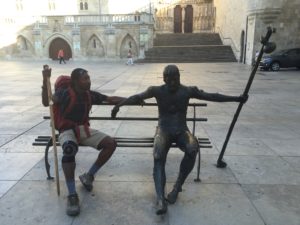
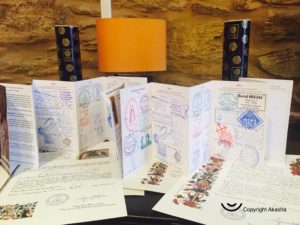
Evidence Based Coaching (EBC) Thought Leaders Webinar: Walking Into Ourselves: Pilgrimages as a Model for Developmental Coaching
Was held on Saturday, November 16, 2019
Watch the On-Demand video now at https://youtu.be/mT-22GjnKtE
Speaker: Akasha, PhD, PCC – www.solfireconsulting.com
Host: Terry H. Hildebrandt, PhD, MCC, MCEC – Director of Evidence Based Coaching, Fielding Graduate University
Coaching is as much a journey as pilgrimages are. Pilgrimages are quests, or journeys, to a sacred site. The effects of a pilgrimage continue long after the pilgrim arrives at the sacred center. As with coachees, the pilgrim arrives to continue to the next milestone. There are several examples in western literature that explore pilgrimages as experiences of self-transformation and growth, including Homer’s Odyssey, Dante’s Divine Comedy, Joyce’s Ulysses, and Equiano’s The Interesting Narrative of the Life of Olaudah Equiano (The African). The Camino de Santiago is one such quest that is said to restore passion for life and facilitate transformative learning, spiritual awakening, and shifts in meaning-making. This is a conversation to explore both the transformative power of pilgrimages as well as how pilgrimages can serve as a model for developmental coaching. Akasha also presents his early conceptualization of the Pilgrimage Coaching Model to support developmental coaching.
Bio of Akasha
Akasha is a pilgrim, educator, and developmental coach with over 10 years of professional experience. He brings deep practice and interest in spirituality, adult development, and inclusive leadership for engaging across multiple social identity differences. He is a consultant with Solfire Consulting Group and currently teaches in the Evidence-Based Coach Training Certificate program at Fielding Graduate University and in the schools of Graduate Studies and Arts and Sciences at St. George’s University in Grenada. He is ever on the move and now spends most of his time between Grenada and Bermuda with his partner, their son, and a very protective and energetic cockapoo dog.
For more on Fielding’s EBC Coach Training Program, see http://coach.fielding.edu
#coach #ebc #fielding #coachtraining #coaching #evidencebasedcoaching
References
Berger, J. G. (2004). Dancing on the threshold of meaning: Recognizing and Understanding the Growing Edge. Journal of Transformative Education, 2(4), 336-351.
Berger, J. G. & Atkins, P. W. (2009). Mapping complexity of mind: Using the subject-object interview in coaching. Coaching: An International Journal of Theory, Research and Practice, 2(1), 23-36.
Cook-Greuter, S. R. (2004). Making the case for a developmental perspective. Industrial and commercial training, 36(7), 275-281.
Cook-Greuter, S. R. (2013). Nine levels of increasing embrace in ego development: A full-spectrum theory of vertical growth and meaning making. Zugriff am, 18, 2015
Cousineau, P. (1998). The art of pilgrimage. Berkeley, CA: Conari Press.
Frankl, V. E. (1985). Man’s search for meaning. New York, NY: Simon and Schuster.
Hooks, B. (1994). Teaching to transgress: Education as the practice of freedom. New York, NY: Routledge.
Kegan, R. (1994). In over our heads: The mental demands of modern life. Cambridge, MA: Harvard University Press.
Morinis, E.A., (1992). Sacred journeys: The anthropology of pilgrimage. London: Greenwood.
Tisdell, E. (2017). Transformative pilgrimage learning and spirituality on the Camino de Santiago. In A. Laros, T. Tuhr, & E. Taylor (eds), Transformative learning meets Bildung (pp. 341-352). The Netherlands: Sense Publishing.
Saunders, P. (2018). Waking Up While Black: How A Jamaican Border-Dwelling Bredda Makes Meaning of His Camino De Santiago Pilgrimage (Doctoral dissertation, Fielding Graduate University).
Sheared, V. & Sissel, P. (Eds.). (2001). Making space: Merging theory and practice in adult education. Westport, CT: Greenwood Publishing Group.
Wong, P. T. (1989). Personal meaning and successful aging. Canadian Psychology/Psychologie Canadienne, 30(3), 516.
Join Over 7,500 Fielding Alumni Located Around The World!
Change the world. Start with yours.™
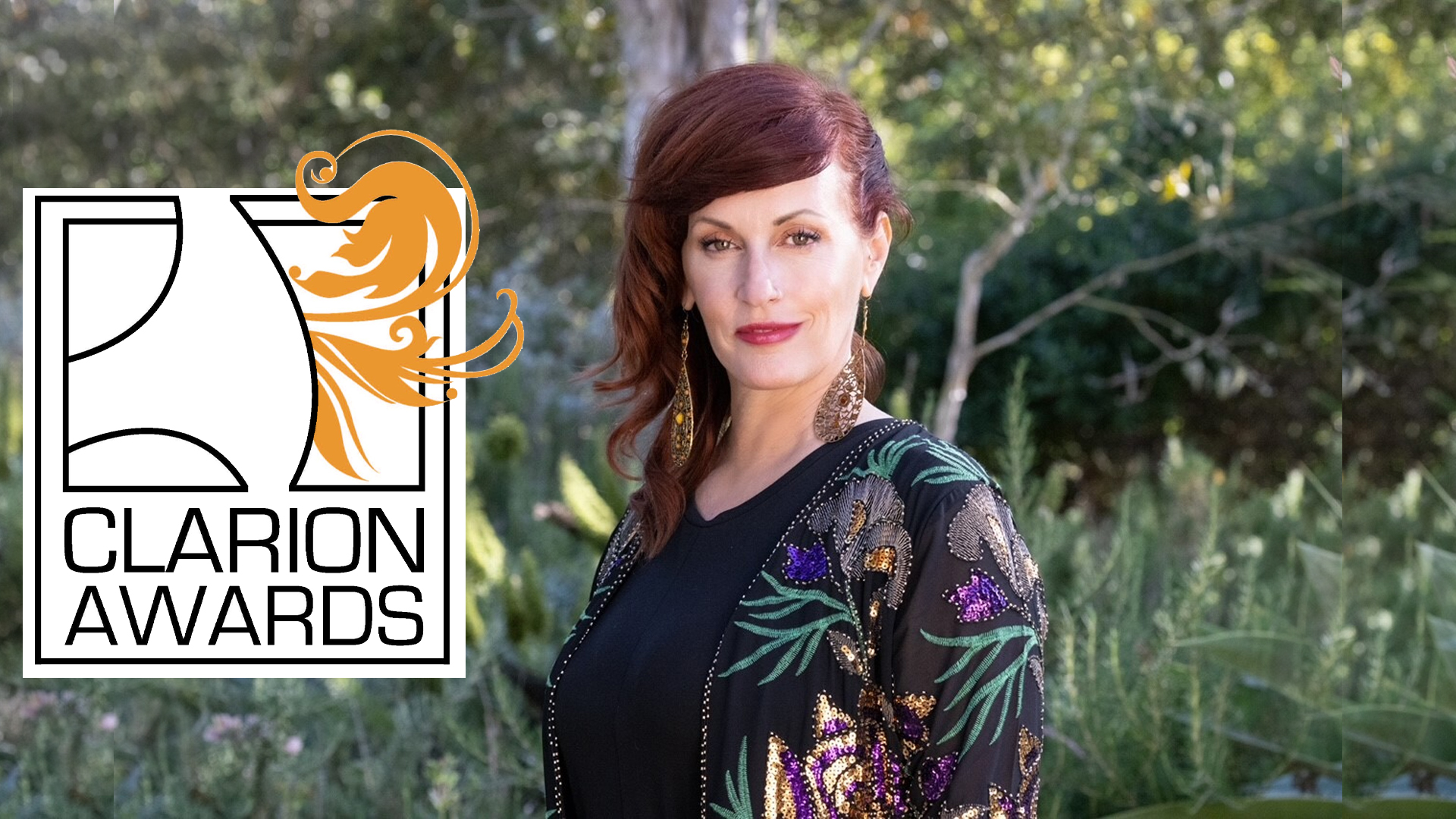





Get Social